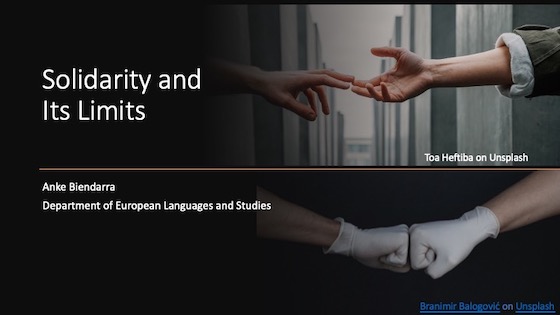
Solidarity and Its Limits
Professor Anke Biendarra offers her reflections on COVID-19.
As a cultural hybrid living in-between two cultures and languages and as a scholar focusing on the literature and culture of contemporary Germany and Europe, I have been reading daily about the ways in which European countries are approaching the Coronavirus pandemic....
Solidarity is also one of the most frequently used words in Europe’s public discourse and media; appeals to it have multiplied as a consequence of recent turmoil such as the financial crash of 2008 and the so-called refugee crisis of 2015. While mutual support might work reasonably well on an interpersonal level, the Coronavirus outbreak is rapidly revealing the limits of solidarity when it comes to nation states, confirming that it is not a genuine “European” value per se but is borrowed from the national political vocabulary. Despite the fact that a global pandemic requires what Ulrich Beck in his studies on second modernity calls a “cosmopolitan frame of reference” or even the application of “cosmopolitical realpolitik,” what we are actually witnessing is the strong resurgence of nationalistic outlooks within the European Union as a conglomerate of twenty-seven countries with supremely diverse cultures and histories. The Brexit campaign, Spain’s separatist movement, France’s gilet jaunes protests, and the rise of neo-fascist discourses and parties across the continent (to name just a few of the 2019 issues du jour, which in light of recent developments seem, quite literally, those of yesteryear) had already revealed deep divisions on the continent that put European values and ideologies in question. But the Corona crisis has sharpened these existing divisions even more. The pandemic is threatening to once and for all end the vision of a united Europe whose actions are grounded in mutual solidarity and shared values.
To be sure, there is a lot of rhetoric and some actual distribution of resources across the now-closed borders, which is in line with frameworks such as the Treaty of Lisbon and the “solidarity clause” of Article 222 about the workings of the European Union that stipulates that member states will lend support in cases of terror attacks, natural disasters or catastrophes caused by human errors. Germany, where hospitals are not (yet) overwhelmed, is treating upwards of one hundred and twenty severely ill Covid-19 patients from France, Spain, and Italy and has sent seven tons of medical gear to Italy, while France donated a million masks to this hardest-hit European country. But as the debates about “Corona bonds” that would make all European countries equally liable for the debt being accrued during the crisis show, solidarity is easiest when it does not come at too high a cost for the richer countries of the north.
Maybe the most egregious example of this is the situation on the Greek island of Lesbos, where more than 20.000 migrants are languishing in limbo, held there by a treaty the EU made with Turkey in 2016. Jean Ziegler, Vice President of the Advisory Committee of the UN Human Rights Council, has likened the treatment of refugees on the outer borders of the European Union to a crime against humanity and the infamous Camp Moria has become the symbol of the utterly failed European approach to the ongoing refugee crisis. Before the Coronavirus hit, the EU had agreed to evacuate at least 1,000 to 1,500 sick and traumatized children and unaccompanied minors under the age of fourteen. But at the beginning of April, Germany only committed to taking fifty kids while Luxembourg agreed to take twelve. Other European countries cited national interest and challenges during the Coronavirus crisis to explain their delay in helping the most vulnerable. While the social democracies of Europe are committing billions of euros to mitigating the catastrophic outcomes of a global economic meltdown and protecting their people from becoming destitute, their actions starkly reveal how they guard their own national interests and focus on those who “belong” to the national body by virtue of possessing citizenship. Camps, such as the one at Moria, which Giorgio Agamben has called “the hidden paradigm of the political space of modernity” and a “pure, absolute, and impassable biopolitical space,” have the refugee as their emblem: Forgotten and reduced to bare life, always already excluded from entry into the fortress that is contemporary Europe, the shameful treatment of migrants at its borders reveals the limits of supranational solidarity.
